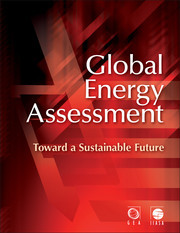Description
Global Energy Assessment
Toward a Sustainable Future
Author: Global Energy Assessment Writing Team
Independent, scientifically based, integrated, policy-relevant analysis of current and emerging energy issues for specialists and policymakers in academia, industry, government.
Language: English
Approximative price 278.64 €
In Print (Delivery period: 14 days).
Add to cart
Global Energy Assessment
Publication date: 08-2012
1882 p. · 22.1x28.2 cm · Hardback
Publication date: 08-2012
1882 p. · 22.1x28.2 cm · Hardback
Approximative price 85.88 €
In Print (Delivery period: 14 days).
Add to cart
Global energy assessment. Toward a sustainable future
Publication date: 08-2012
1882 p. · 21.5x27.3 cm · Paperback
Publication date: 08-2012
1882 p. · 21.5x27.3 cm · Paperback
Description
/li>Contents
/li>Biography
/li>
The Global Energy Assessment (GEA) brings together over 300 international researchers to provide an independent, scientifically based, integrated and policy-relevant analysis of current and emerging energy issues and options. It has been peer-reviewed anonymously by an additional 200 international experts. The GEA assesses the major global challenges for sustainable development and their linkages to energy; the technologies and resources available for providing energy services; future energy systems that address the major challenges; and the policies and other measures that are needed to realize transformational change toward sustainable energy futures. The GEA goes beyond existing studies on energy issues by presenting a comprehensive and integrated analysis of energy challenges, opportunities and strategies, for developing, industrialized and emerging economies. This volume is an invaluable resource for energy specialists and technologists in all sectors (academia, industry and government) as well as policymakers, development economists and practitioners in international organizations and national governments.
Foreword; Preface; Key findings; Summary for policy makers; Technical summary; 1. Energy primer; 2. Energy, poverty, and development; 3. Energy and environment; 4. Energy and health; 5. Energy and security; 6. Energy and economy; 7. Energy resources and potentials; 8. Energy end-use: industry; 9. Energy end-use: transport; 10. Energy end-use: buildings; 11. Renewable energy; 12. Fossil energy; 13. Carbon capture and storage; 14. Nuclear energy; 15. Energy supply systems; 16. Transitions in energy systems; 17. Energy pathways for sustainable development; 18. Urban energy systems; 19. Energy access for development; 20. Land and water: linkages to bioenergy; 21. Lifestyles, well-being and energy; 22. Policies for energy system transformations: objectives and instruments; 23. Policies for energy access; 24. Policies for the Energy Technology Innovation System (ETIS); 25. Policies for capacity development; Annex I. Acronyms, abbreviations and chemical symbols; Annex II. Technical guidelines; Annex III. Contributors to the Global Energy Assessment; Annex IV. Reviewers of the Global Energy Assessment; Index.
The GEA Writing Team consists of over 300 international researchers, who provide an independent, scientifically based, integrated, policy-relevant analysis of current and emerging energy issues.
© 2024 LAVOISIER S.A.S.




